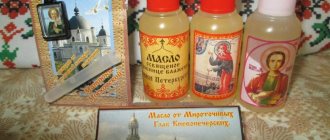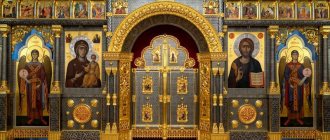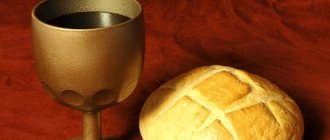The following types of incense are used in temples:
Oil is oil (usually olive) for anointing during the Sacrament of Unction.
Miro is an aromatic oil with the addition of aromatic herbs.
Myrrh (myrrh) is a hardened resin from the bark of a tree of the Burzer family.
Frankincense is the hardened resin of the Boswellia tree.
There is a separate article about incense: How to choose and light incense. This article will focus on aromatic oils.
Share this article with your friends:
How to use
Oil of Saint Matrona of Moscow can be used from birth. A drop of the product on the forehead will protect the baby from infections and the evil eye. 10 ml of miraculous oil added to the water during bathing will protect the baby’s delicate skin from excessive dryness.
In places where large numbers of people gather, there is a high risk of contracting an infection. For older children, the product is applied to the area above the upper lip in order to prevent the penetration of harmful viruses and bacteria into the body through the nasal openings.
How to share blessed oil?
The result of a trip to distant Holy places is often the acquisition of numerous rare and especially healing consecrated oils from the relics. Such unique oils cure illnesses surprisingly quickly, but their volume is not so large that you can distribute the oil to everyone you know and those who are sick.
Diveyevo traditions allow in such cases to prepare a clean bottle, fill it with simple vegetable oil and, through accompanying prayers, consecrate it for donation. Prayers over the prepared composition must certainly include an appeal to the Mother of God, the prayer “Our Father...” and a prayer word to the saint from whose relics your oil is consecrated.
How to prepare this oil and how to store it
Now let's look at how oil is prepared, what kind of composition is it? It is prepared very strictly. The main thing here is pure olive oil; if necessary, aromatic components are added. Then the clergyman reads special prayers depending on what the oil is intended for.
There are also oils that were blessed on relics; they can have miraculous powers. And very useful for those who are sick spiritually or physically.
This oil should be stored near the home altar or where the icons stand. You can purchase a special container for it, which is sold at churches. It is not recommended to keep it in the refrigerator or first aid kit.
Useful tips
If you purchase scented lamp oil, it is important to be especially confident in the reliability of the supplier: unscrupulous manufacturers use aromatic additives to remove the smell of low-purity oil. The same applies to colored oils.
If you use a mixture of vaseline oil and olive oil, when using a regular wick, the share of the second should not exceed 20%.
If you filled the lamp with natural olive oil or a mixture in which its content exceeds 20%, you should use a “Greek” wick on the float. When using it, you need to pour a little water into the bottom of the lamp, otherwise, when the oil burns out, the wick may burst into flames, creating a fire hazard.
And real Vaseline
Lamp oil and
olive
oil thicken at temperatures approaching zero degrees. Thanks to this, they can be easily distinguished from counterfeits even at home by placing them in the refrigerator.
Eli: what is this? Church oil
Oil - what is it? A special oil that is used in various rituals. There are many references and instructions on this matter in the Holy Scriptures. Many consider oil to be a magic wand for ailments, but it is given to everyone only according to their faith. Therefore, using oil without inner spiritual work is useless. Myrrh is just as important in the church bosom.
What is lamp oil?
Lamp oil is the oil that burns in lamps - lamps, traditionally lit in front of icons.
Lamps of different designs require the use of lamp oil with different compositions. The usual open
(Russian) lamps
are filled with oil of normal consistency - natural olive or synthetic. Closed, so-called Greek lamps, which look like a miniature kerosene lamp, are filled with special low-viscosity mineral oil. That's what it's called - oil for Greek lamps.
Miro is a special sacred liquid
The Holy Myrrh is consecrated once a year - on Maundy Thursday on Holy Week on the eve of Easter. In the ancient Church, this rite was established because the Baptism of new Christians was usually carried out on Holy Saturday and Easter. Today it is carried out according to custom. In the Russian Orthodox Church, Its head, His Holiness the Patriarch, sanctifies olive oil with a mixture of precious aromas as peace. It is brewed during the first weekdays of Holy Week according to a special ancient method, and after consecration it is sent to all parishes of the Church. Without peace, the Sacrament of Baptism, combined with the Sacrament of Confirmation, remains incomplete - through the chrism the newly baptized person receives the gifts of the grace of the Holy Spirit.
Then the myrrh in special myrrh vessels is transferred to churches, where it is kept on the throne.
Confirmation
Confirmation after the Sacrament of Baptism. Photo by Nadezhda Tkachenko
A sacrament of the Orthodox Church, which is performed immediately after Baptism. In it, a person is anointed with a specially prepared fragrant composition based on olive oil - myrrh, through which the grace of the Holy Spirit is communicated to him. Confirmation is performed once in a lifetime: at baptism or when Christians of some other denominations join the Orthodox Church, if it has not been performed before. .
During the Sacrament, the priest anoints the forehead, eyes, ears, chest, hands and feet of the newly baptized with chrism with the words: “Seal of the gift of the Holy Spirit. Amen".
Miro is a mixture of olive oil, white wine and more than 40 incense (incense, galangal and ginger roots, rose petals and others). It is brewed and consecrated by the primate of the independent Church once every few years on Maundy Thursday and sent to all dioceses. In the Russian Church this is done by His Holiness the Patriarch of Moscow and All Rus'. Myrrh is brewed in the Donskoy Monastery in Moscow, and consecrated in the Cathedral of Christ the Savior.
What does blessed oil do?
The strength of the remedy lies not only in its unique composition, but also in the divine energy of the Orthodox faith, rooted in tradition and the opposition of the righteous and true champions of the Law of God to sinful thoughts and actions.
Who will need the oil of Saint Matrona to help? The answer is simple: everyone. Matronushka herself urged people to come to her for help:
“Everyone, everyone, come to me and tell me, as if alive, about your sorrows. I will see you, and hear you, and help you.”
Only edible (vegetable) consecrated oil can be consumed internally. Any other oil is used exclusively for external use - anointing. An indication of the origin of the oil is usually found on the label or in the instructions for use.
What types of blessed oil are there?
Blessed oil can be lamp oil, Vaseline oil, or vegetable oil. The latter is edible. It can be dripped in a small volume onto prosphora, artos, antidor or any food from the table, and then eat the food. When eating consecrated oil, be sure to read the appropriate prayer.
Non-edible consecrated oil is suitable for anointing. Church shops offer both oils consecrated on relics and simply oil compositions for lamps, which are also consecrated. There are strict rules regarding the use of oils in the Church.
So, for example, the oil that was used at the Blessing of Anointing cannot be placed in lamps or mixed with other substances, or poured out. Blessed oil is similar in power to holy water, but it is not suitable for sprinkling houses. This oil heals illnesses when applied to the body, and also invigorates the healthy spirit when anointing the heart and forehead area with a cross every morning.
Oil consecrated on the relics of saints is closely associated with the shrine to which it belongs. Accordingly, the Saint will help in illness, and prayers should be addressed to him. Also suitable for anointing is the prayer “Our Father...” or a prayer appeal to the Mother of God. If you do not know prayers, it is not forbidden to ask for healing in your own words: with due diligence and sincerity, the disease will go away under the influence of the consecrated oil.
Blessing of the oil (Photo from the site)
Blessing of Unction (Unction)
Unction.
Photo by Yulia Makoveychuk A sacrament of the Orthodox Church, through which healing of spiritual and physical ailments is given by the grace of God. In this Sacrament, when anointing the body with oil, the grace of God is invoked on the sick person, healing mental and physical infirmities. Unction is necessary in order to strengthen a person in illness and spiritually support him.
For it, the participation of several priests is desirable (hence another name - Unction), but only one is allowed. In the practice of the Russian Orthodox Church, unction is performed on everyone during Great Lent and the Nativity Fast. Usually they meet once a year. Unction can also be performed individually on a seriously ill person.
The composition of the anointing, which is consecrated during the Sacrament, includes olive oil and wine, as in the parable of the Good Samaritan. Oil symbolizes the mercy of God, wine – blood.
During the Sacrament, the priest anoints the forehead, nostrils, cheeks, mouth, upper chest, palms on the inside and outside. During the celebration of the Sacrament, it is customary to stand with a lit candle in your hands. When anointing with holy oil occurs, the candle is extinguished. Anointing is performed 7 times after reading 7 pairs of passages from the Gospel and the Apostolic Epistles. Afterwards, the priest places the Gospel on the head(s) of the person being consecrated and prays for forgiveness of sins.
Bethel - House of God
Oil is closely associated with the House of God. It is there that you will find the Angels of God ascending and descending to the Son of Man.
Where can I find oil and all the promises of God about protection and care? In the House of God. The house of God is not brick walls or a building. The house of God is when we all come together.
(Ps 90:9) For you have said: “The Lord is my hope”; You have chosen the Almighty as your refuge.
It will be right if you make the House of God your abode.
People often read the Bible superficially, but it needs to be explored. If you read Psalm 90:9 in Hebrew, you can see the word “oil.”
If you apply oil to something, then evil will not stick to you.
(Ps 90:9-10) For you have said
: “The Lord is my hope”; You have chosen the Most High as your refuge; no evil will befall you, and no plague will come near your dwelling.
Anoint your home and your loved ones with oil. Under the blessing and anointing of the Lord, the oil becomes anointing oil—holy oil.
Saint - set apart for a special purpose.
The devil cannot touch what is holy. He deals only with the dirty and unclean - with that which bears the mark of sin.
Unbelief in the forgiveness of sins is also the food of Satan.
Holiness is integrity.
Illness is not a natural state. God never intended for man to be sick. God wants man to always be healthy and whole.
Holy - set apart, special.
When you pray in the name of Jesus Christ, the anointing will fall on the oil.
Anointing oil in church shops
In church shops you can buy consecrated anointing oil from various saints. It can be brought from holy places - for example, from the Holy Sepulcher, from Diveevo, etc. or manufactured in production and consecrated by an invited priest. As a rule, this oil should not be eaten. It is poured into small, usually plastic, vials, on the labels of which there is a picture of a saint or an icon, the prayer to which the oil is consecrated and a signature, for example: oil from the blessed. Matrons, consecrated oil from the icon of the Mother of God “The All-Tsarina”, etc. When the oil runs out, the bottle or at least the label with the icon should be burned.
Symbolism and history
Oil, oil is a symbol of God's mercy and human mercy. In ancient times, natural olive oil was used as a medicine - in particular, it was poured on wounds, and also lubricated with it to soften the skin in the hot southern climate.
The Apostle James writes in his letter: “ If any of you is sick, let him call the elders of the Church, and let them pray over him, anointing him with oil in the name of the Lord. And the prayer of faith will heal the sick” (James 5:14-15).
This is how the sacrament of Unction was established
.
Mentions of miracles of healing
that
occurred during anointing with oil from a lamp burning in front of a revered shrine have been found in Christian texts since ancient times.
Symbol of God's mercy
Photo: Hramnadevichiem.ru
Oil is olive oil to which aromatic components have been added. Since ancient times, from the origins of the development of Christianity, its sanctification occurs through prayer, only then is it used for the needs of the church and the healing of human ailments.
The consecrated oil has a deep symbolic meaning and embodies the Grace of God, combined with the concepts of joy and revival. The apostles used it to heal the sick and lepers. From the moment the oil was sprinkled, the Divine Spirit abided in the soul of the believer.
The Sacrament of Anointing is also associated with the anointing of a Christian with consecrated oil for the sake of his healing and accompaniment in earthly life in a state of being filled with the Holy Spirit. Blessing of oil is not only capable of healing ailments, it also forgives sins, as a result of which a person becomes pure before God. The power of this Sacrament lies mainly in the accompanying priestly prayer.










